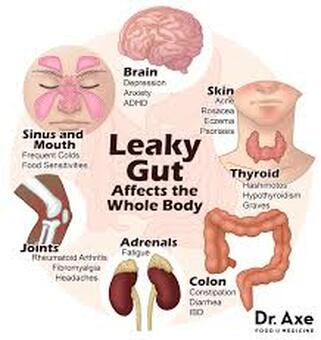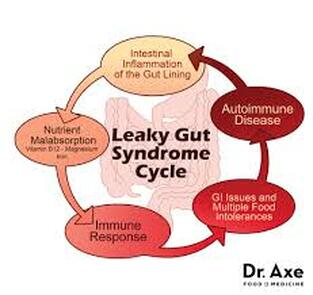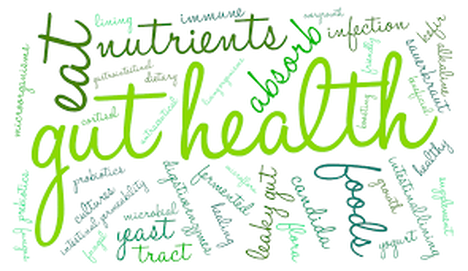 Part I of our health gut series was an introduction into the importance of striving to keep our gut healthy. As we read, gut health is the foundation to our immune system. If we don't take care of our gut health, we disrupt our microdome, which results in damage to the intestinal barrier needed to keep foreign materials out of our blood stream. This leakage of material into our blood stream is also known as Leaky Gut. Lets go back a little bit to address the 4 top struggles that contribute to an unhealthy gut/intestinal/digestive system. 1) Stress Stress changes our hormonal balance within our bodies. With stress we find increased bowel motility and defecation while at the same time reducing gastric emptying time. Stress induced changes in the bowel motility can result in altered gut pH and nutrient absorption causing bacterial overgrowth which leads to vulnerability to pathogenic organisms. Additionally, mucosal barrier disruptions equating into an over stimulation of the immune system. 2) Diet The GI tract is exposed to 30-50 TONS of food in the average lifetime. Too many highly processed foods that are devoid of nutrients needed for health are taking over our food industry. Our diets are consisting of too many refined carbohydrates, hydrogenated fatty acids, food preservatives and food additives. Chronic poor eating places a burden on the digestive tract leading to reduced bowel transit time, sluggish detoxification, and increased inflammation. 3) Medications Drugs (over the counter or prescribed) alter the gut microbia composition. Relying on chemicals comes at a risk of damaging the gut and can be counter intuitive since these drugs have the potential to create future disease development or simply be causing the chronic issues that you are trying to treat. Common examples of medications that do a number on your gut health are:
4) Food Allergies, Sensitivities, & Intolerances Any of the above can be characterized by any negative reaction to food. Food Sensitivities are non allergic immune responses to a component(s) of a food, an example is Gluten. The gliadin protein in gluten triggers an immune response causing inflammation along the inner lining of the small intestinal wall. Food Intolerance is the difficulty digesting certain foods due to a lack of proper enzymes. There is no immune response with a food intolerance, and symptoms are typically limited to diarrhea and/or vomiting. Commonly seen with eggs, milk, and gluten. Food Allergies affect 3% of our population in the IgE category. There are two types of allergic reactions from the body due to a food allergy, IgE and IgG/IgA. A little about our IgA, IgE, and IgG immune responses. IgA, IgG and IgE refer to immunoglobulins, or “antibodies.” These antibodies are part of our immune system, and are produced in response to things we come in contact with on a daily basis. Our bodies make antibodies to foreign substances like bacteria and viral cells, but can also respond to foods, dust, dander, and pollen. Antibodies help the body mount an immune system response (“fight”) against foreign invaders. IgA and IgG reactions are known as delayed response reactions, that include food sensitivities, where IgE responses are immediate and are considered a true food allergy. IgA and IgG reactions may not happen immediately, but can take hours to days to show up in your skin or intestines, and cause symptoms related to inflammation like headaches, fatigue, brain fog, or joint pain. People with food intolerance may experience digestive upset like nausea, constipation, or diarrhea, or skin itching and rashes including conditions like eczema and psoriasis. IgE immediate hypersensitivity reactions are characterized by hives and throat swelling that accompany anaphylactic reactions some people experience when exposed to certain foods. Other symptoms can include wheezing, coughing, a runny nose, vomiting, swelling of the lips or tongue, tearing or redness of the eyes, or even a weak pulse and loss of consciousness. Common foods that trigger IgE reactions are peanuts, shellfish, egg, dairy products, soy, tree nuts, wheat and fish. So how does your gut health contribute to an autoimmune disease? Autoimmune disease is on the rise in a major way. According to the National Institutes of Health (NIH), 23.5 million Americans suffer from a form of an autoimmune disease, but some think that number is actually closer to 50 million. There are at least 80 to 100 different diagnosable autoimmune diseases worldwide, and more are being studied and diagnosed every single day. We turn back to the relationship of the gut and overall health. Also the gut and our immune system, or lack thereof. Let's re-familiarize ourselves with the word below... dysbiosis /ˌdisbīˈōsəs/ an imbalance between the types of organism present in a person's natural microflora, especially that of the gut, thought to contribute to a range of conditions of ill health. Over time, having dysbiosis in your gut microbiome will eventually lead to a leaky gut. If your gut is leaky, food particles, toxins and infections can get through your intestinal lining and into your bloodstream where your immune system detects them as foreign invaders and goes on high alert, attacking them and creating inflammation. One main way inflammation occurs is that the food particles (especially gluten and casein, a protein found in dairy), toxins and infections look very similar to our own body’s cells and our immune system gets confused and accidentally attacks our own tissue, which leads to autoimmunity. This process is called molecular mimicry. Molecular mimicry is defined as the theoretical possibility that sequence similarities between foreign and self-peptides are sufficient to result in the cross-activation of autoreactive T or B cells by pathogen-derived peptides. (*This is google worthy on a snowy day if you are more interested in autoimmune origins.) It’s a cycle that works like this: altered gut microbiome or dysbiosis => leaky gut => food, toxins and infections into bloodstream => immune system attacks body due to molecular mimicry => autoimmune disease. In March of 2018, Yale University did a study on the gut bacteria in humans and mice. They discovered that certain bacteria in the gut (E. gallinarum) is able to trans-locate outside of the gut into the lymph nodes, liver, and spleen. This bacteria attacked tissues outside of the gut and initiated the production of auto-antibodies and inflammation. It was a theory that these foreign substances that leaked out of the gut and trans-located also invaded the incorrect cell space by Molecular Mimicry.  Dr. Axe that helps to simplify and describe the cycle we start to struggle with when health of our gut starts to decline. Symptoms This is a list of symptoms that are the most common with people struggling with poor gut health. It's truly exciting to think that we can start healing many health problems simply with diet. Going back to eating whole foods is understandably not the easiest when McDonald's has your food ready in 2 minutes with barely any clean up, BUT 5, 10, 20+ years from now when you are living with a slew of medical problems and feel miserable every single day you are guaranteed to look back and regret taking the extra time and effort to prevent your problems. Next week we will discuss taking those first steps to heal your gut. I will try to help simplify your plans for eating healthier and simply making better choices for yourself and your family.
0 Comments
Your comment will be posted after it is approved.
Leave a Reply. |
AuthorsDr. MJ Wegmann, Archives
July 2023
Categories
All
|


 RSS Feed
RSS Feed